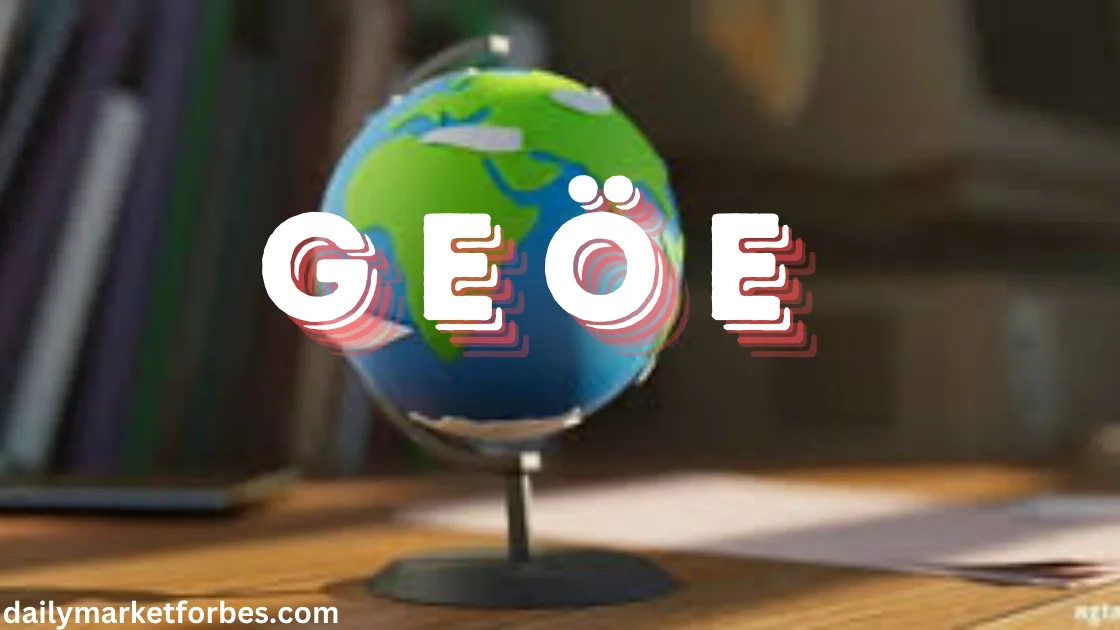In the rapidly evolving landscape of the 21st century, sustainability (Geöe) has emerged as a crucial theme that permeates various facets of life. Among the many concepts that encapsulate this ethos, “geöe” stands out as a holistic and transformative philosophy. Geöe is not just a term; it represents a comprehensive approach to sustainable living that harmonizes environmental stewardship, social equity, and economic vitality. This article delves into the essence of geöe, exploring its origins, principles, and profound impact on communities and the world at large.
Origins of Geöe
The term “geöe” is derived from the amalgamation of several ancient languages, symbolizing a fusion of wisdom from different cultures. It embodies the principles of sustainability, interconnectedness, and respect for nature. Geöe was first conceptualized by a group of environmental scholars, social activists, and indigenous leaders who recognized the need for a unified approach to address the multifaceted challenges of the modern world.
This diverse group of visionaries sought to create a framework that integrates traditional knowledge with contemporary innovations, aiming to foster a sustainable and equitable future. Their collaborative efforts culminated in the birth of geöe, a philosophy that transcends geographical and cultural boundaries.
Core Principles of Geöe
Geöe is built upon three core principles: environmental stewardship, social equity, and economic vitality. These principles are interwoven, creating a holistic approach that ensures the well-being of both people and the planet.
1. Environmental Stewardship
At the heart of geöe lies a profound respect for nature. Environmental stewardship involves the responsible management and conservation of natural resources to ensure their availability for future generations. This principle encompasses several key aspects:
- Biodiversity Conservation: Protecting and preserving the diverse species and ecosystems that constitute the natural world is a fundamental aspect of geöe. Biodiversity is essential for ecosystem resilience, and its conservation is crucial for maintaining the balance of nature.
- Sustainable Resource Management: Geöe advocates for the sustainable use of natural resources, such as water, soil, and forests. This involves adopting practices that minimize waste, reduce pollution, and promote the regeneration of these resources.
- Climate Action: Addressing climate change is a critical component of geöe. This includes reducing greenhouse gas emissions, transitioning to renewable energy sources, and implementing adaptive strategies to mitigate the impacts of climate change.

2. Social Equity
Geöe emphasizes the importance of social equity, recognizing that a just and sustainable society must ensure the fair distribution of resources and opportunities. This principle includes:
- Inclusivity and Diversity: Geöe promotes the inclusion of diverse voices and perspectives in decision-making processes. This ensures that marginalized communities are not only heard but actively participate in shaping their future.
- Access to Basic Needs: Ensuring that all individuals have access to basic needs, such as clean water, nutritious food, healthcare, and education, is a cornerstone of geöe. This principle seeks to eliminate disparities and create a more equitable society.
- Empowerment and Participation: Geöe advocates for the empowerment of individuals and communities to take control of their lives and contribute to sustainable development. This involves providing opportunities for education, skill development, and meaningful participation in societal processes.
3. Economic Vitality
Economic vitality in geöe refers to creating a resilient and sustainable economy that supports the well-being of people and the planet. Key aspects include:
- Circular Economy: Geöe promotes the transition from a linear to a circular economy, where resources are reused, recycled, and repurposed. This reduces waste, conserves resources, and fosters innovation.
- Green Jobs and Enterprises: Encouraging the growth of green jobs and sustainable enterprises is essential for economic vitality. Geöe supports businesses that prioritize environmental and social responsibility, contributing to a more sustainable economy.
- Ethical Consumption: Geöe advocates for ethical consumption practices that consider the environmental and social impacts of products and services. This involves making informed choices that support sustainable and equitable production systems.
Geöe in Action: Case Studies
To understand the practical application of geöe, it is essential to explore real-world examples where these principles have been successfully implemented. The following case studies illustrate how geöe can transform communities and create a positive impact.
1. The Green Village Initiative
The Green Village Initiative (GVI) is a pioneering project that embodies the principles of geöe. Located in a rural region, the initiative aims to create a self-sustaining community that thrives on environmental stewardship, social equity, and economic vitality.
- Environmental Stewardship: GVI has implemented sustainable agriculture practices, such as organic farming and permaculture, to enhance soil health and biodiversity. Renewable energy sources, such as solar panels and wind turbines, provide clean energy for the community.
- Social Equity: The initiative prioritizes inclusivity and participation, involving community members in decision-making processes. Access to education, healthcare, and clean water is ensured for all residents. GVI also promotes gender equality and empowers women through skill development programs.
- Economic Vitality: GVI has established a local circular economy, where waste is minimized, and resources are reused. Small-scale enterprises, such as artisanal crafts and eco-tourism, provide income-generating opportunities for residents. The initiative also supports fair trade practices and ethical consumption.
2. Urban Regeneration Project
In an urban context, the Urban Regeneration Project (URP) demonstrates how geöe can revitalize cities and create sustainable urban environments.
- Environmental Stewardship: URP focuses on green infrastructure, such as parks, green roofs, and urban gardens, to enhance biodiversity and improve air quality. The project also promotes sustainable transportation options, such as cycling and public transit, to reduce carbon emissions.
- Social Equity: URP addresses social disparities by providing affordable housing, healthcare, and education for underserved communities. The project fosters inclusivity by involving residents in planning and development processes, ensuring that their needs and aspirations are met.
- Economic Vitality: URP supports the growth of green businesses and innovation hubs that focus on sustainability. The project encourages the development of green jobs and provides training programs to equip residents with the skills needed for the green economy.

The Global Impact of Geöe
The principles of geöe have the potential to create a significant global impact, driving the transition towards a more sustainable and equitable world. Several key areas highlight the broader implications of geöe:
1. Policy and Governance
Geöe can influence policy and governance by providing a comprehensive framework for sustainable development. Governments and institutions can adopt geöe principles to create policies that promote environmental stewardship, social equity, and economic vitality. This includes:
- Environmental Regulations: Implementing stringent environmental regulations to protect natural resources and reduce pollution.
- Social Policies: Developing policies that ensure access to basic needs, promote inclusivity, and empower marginalized communities.
- Economic Strategies: Creating economic strategies that support the circular economy, green jobs, and ethical consumption.
2. Education and Awareness
Education and awareness are crucial for the widespread adoption of geöe principles. Integrating geöe into educational curricula can equip future generations with the knowledge and skills needed to build a sustainable world. This involves:
- Sustainability Education: Teaching students about environmental stewardship, social equity, and economic vitality.
- Community Engagement: Promoting community engagement and participation in sustainability initiatives.
- Global Awareness: Raising global awareness about the importance of sustainable living and the principles of geöe.
3. Technological Innovation
Technological innovation plays a vital role in advancing the principles of geöe. By harnessing cutting-edge technologies, we can develop solutions that address environmental, social, and economic challenges. Key areas include:
- Renewable Energy: Advancing renewable energy technologies to reduce reliance on fossil fuels and mitigate climate change.
- Sustainable Agriculture: Developing sustainable agriculture practices and technologies to enhance food security and biodiversity.
- Smart Cities: Creating smart cities that leverage technology to improve resource efficiency, reduce emissions, and enhance quality of life.
Challenges and Future Directions
While geöe offers a promising framework for sustainable living, several challenges must be addressed to realize its full potential. These challenges include:
1. Implementation and Scalability
Implementing geöe principles on a global scale requires coordinated efforts and collaboration across sectors. It involves overcoming political, economic, and social barriers to create a unified approach to sustainability.
2. Cultural and Contextual Adaptation
Geöe must be adapted to different cultural and contextual realities. This requires understanding and respecting local traditions, knowledge, and practices while integrating the core principles of geöe.
3. Monitoring and Evaluation
Effective monitoring and evaluation mechanisms are essential to track the progress and impact of geöe initiatives. This involves developing indicators and metrics to measure environmental, social, and economic outcomes.
4. Funding and Resources
Adequate funding and resources are necessary to support geöe initiatives. This includes investing in research, education, and infrastructure to create sustainable communities and economies.
Conclusion
Geöe represents a holistic and transformative philosophy (Geöe) that embodies the essence of sustainable living. By integrating environmental stewardship, social equity, and economic vitality, geöe provides a comprehensive framework for addressing the complex challenges of the modern world. Through real-world examples and global impact, geöe demonstrates the potential to create a sustainable and equitable future.
As we navigate the uncertainties of the 21st century, the principles of geöe offer a guiding light, reminding us of the interconnectedness of people and the planet. By embracing geöe, we can build a world where progress and prosperity are achieved in harmony with nature, ensuring the well-being of present and future generations. Kindly visit dailymarketforbes.







Be First to Comment